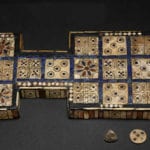 History
History  History
History  Health
Health 10 Everyday Activities That Secretly Alter Consciousness
 History
History Top 10 Historical Disasters Caused by Someone Calling in Sick
 Animals
Animals 10 New Shark Secrets That Recently Dropped
 Movies and TV
Movies and TV 10 Forgotten Realities of Early Live Television Broadcasts
 Technology
Technology 10 Stopgap Technologies That Became Industry Standards
 Weird Stuff
Weird Stuff 10 Wild Facts About Taxidermy That You Probably Didn’t Know
 Travel
Travel 10 Beautiful Travel Destinations (That Will Kill You)
 Miscellaneous
Miscellaneous 10 Modern Marriage Rituals Born from Corporate Branding
 Weird Stuff
Weird Stuff Ten Bizarre Visions of 2026 from Fiction
 History
History 10 “Modern” Problems with Surprising Historical Analogs
 Health
Health 10 Everyday Activities That Secretly Alter Consciousness
 History
History Top 10 Historical Disasters Caused by Someone Calling in Sick
Who's Behind Listverse?

Jamie Frater
Head Editor
Jamie founded Listverse due to an insatiable desire to share fascinating, obscure, and bizarre facts. He has been a guest speaker on numerous national radio and television stations and is a five time published author.
More About Us Animals
Animals 10 New Shark Secrets That Recently Dropped
 Movies and TV
Movies and TV 10 Forgotten Realities of Early Live Television Broadcasts
 Technology
Technology 10 Stopgap Technologies That Became Industry Standards
 Weird Stuff
Weird Stuff 10 Wild Facts About Taxidermy That You Probably Didn’t Know
 Travel
Travel 10 Beautiful Travel Destinations (That Will Kill You)
 Miscellaneous
Miscellaneous 10 Modern Marriage Rituals Born from Corporate Branding
 Weird Stuff
Weird Stuff Ten Bizarre Visions of 2026 from Fiction
10 Big Video Games That Were Supposed To Be Totally Different
While it will surprise few gamers that a video game undergoes changes during the complicated development process, drastic changes that completely alter the original intent of the project typically result in some of the industry’s biggest failures.
Yet that isn’t always the case. In fact, some of the greatest games of all time began their life as something entirely different.
10Halo Was A Real-Time Strategy Game . . . For The Mac
Considering that Halo ended up being a first-person shooter that launched Microsoft’s Xbox into the stratosphere, its origins couldn’t be more bizarre.
If you want to go back to the very beginning, developer Bungie claims that Halo was originally supposed to be a sci-fi, real-time strategy game. While in development for some time under that approach, when the game made its public debut in 1999, it had morphed into a third-person shooter.
Oh, and that debut? It took place at the Macworld convention and was introduced by none other than Steve Jobs himself as a Mac-exclusive project.
Microsoft would eventually make moves to acquire developer Bungie, who further altered the game into a first-person shooter. Who knows how gaming history would have played out if Halo ended up as the gaming gem of the Apple empire?
9Grand Theft Auto Was A Nonviolent Racing Game
Famous for allowing players to freely roam a world where all their crime lord fantasies could come true, Grand Theft Auto‘s origins are far more humble.
Conceived as a multiplayer racing game under the name Race’n’Chase, development strategy switched drastically when a glitch caused the game’s cops to start attacking the players viciously. The entertaining crash fests that gameplay sessions among the development team turned into, along with one developer’s analysis that it was “more fun to be bad,” caused the team to shift gears and explore a more edgy, open design structure.
Considering the embarrassment of riches Grand Theft Auto would go on to garner, this is certainly the case of a happy little accident.
8The Thrilling Alan Wake Was Meant To Be An Open-World Epic
For a game in development for over five years, it shouldn’t surprise anyone that Alan Wake underwent a series of design changes.
But did you know that, for some time, Alan Wake was intended to be a Grand Theft Auto–style sandbox game? Developer Remedy wanted in on the open-world craze of the time but found that it was difficult to incorporate the suspense required for the thriller narrative into a free-roam experience. The concept was eventually scrapped, and developer Oskari Hakkinen even later admitted in an interview that it was a “mistake” to announce it.
What’s funny about this one is that, even though the design was apparently scrapped six months into development, you can see a lot of open-world elements in the final product, especially in the driving segments. Maybe the team wasn’t as far off from an open-world thriller as they thought.
7Devil May Cry Started Development As Resident Evil 4
Devil May Cry is considered to not only be one of the pioneers of the third-person action genre but was generally agreed to be the next big franchise for developer Capcom.
That’s funny, because for some time, it was intended to be a direct follow-up to the other big Capcom franchise: Resident Evil. Beginning its life as Resident Evil 4, Devil May Cry retained all the attitude and fast-paced action it would later become famous for. While it was eventually determined that this style was too radical of a departure for the horror series, the concept proved interesting enough to live on as its own project.
There’s a somewhat ironic ending to this tale, as the Resident Evil 4 we eventually did get is famous for reinventing the aging Resident Evil franchise . . . by incorporating more action-heavy elements.
6Journey To Silius Was The Terminator Game We Always Wanted
Perhaps the most obscure game on this list, Journey to Silius is an action side-scroller that didn’t generate much buzz upon release but has since become something of a cult hit. Of course, it likely would have been even more famous had it been released under its original design as a licensed Terminator game.
That’s right. This semi-obscure action game was originally supposed to be a high-profile NES Terminator adaptation. Once you know this, it’s hard to not see the framework of that universe all throughout the game and equally difficult to not be a little disappointed that this pretty good action game lost the Terminator license during development. Instead, we ended up with some . . . let’s call them “less-than-stellar” attempts at adapting the franchise.
Still, the robotic final boss that looks like a knock-off toy version of Arnold’s robot form in the movie is a nice touch.
5Super Mario Bros. 2 Was A Mod Of An Entirely Different Game
Few major games can boast a more convoluted path to release than the American version of Super Mario Bros. 2.
We mention the American version because the initial Super Mario Bros. follow-up released in Japan was deemed too difficult for a Western release. Instead, Nintendo took a prototype 2-D game from its vaults called Yume Kojo: Doki Doki Panic and tweaked the visuals to match the Mario universe. Oddly enough, some of the environmental and character elements native to the original game went on to become staples of the Mario franchise.
As for the original Japanese sequel? It would be released in America under the title of The Lost Levels as part of Super Mario All-Stars for the Super Nintendo, while the American Super Mario Bros. 2 would go on to be released in Japan under the appropriate name of Super Mario USA.
4Stealth Masterpiece Metal Gear Was Meant To Be A High-Octane Action Game
The world of film is filled with stories of technological limitations causing accidental brilliance. For example, George Lucas had to improvise camera and model techniques to make up for the lack of computer effects available when making Star Wars, while Steven Spielberg’s inability to feature the wonky robotic shark in Jaws forced him to make a more character-based movie.
Gaming’s greatest equivalent of that phenomenon would be the story of the original Metal Gear. Intended to be an action-heavy game with a focus on recreating modern military combat, development hit a snag when the team realized the platform they were developing for couldn’t handle processing their vision. One of the development team members, Hideo Kojima, was tasked with taking over the project. Allegedly inspired in part by The Great Escape, Kojima decided upon a more technologically friendly, stealth-based approach.
It was a novel design approach that few had ever considered before. By all accounts, it was also a somewhat desperate Plan B.
3The Cartoonish Team Fortress 2 Was A Direct Sequel To Its Realistic Military Predecessor
Given the generational gap between their releases, it may surprise some Team Fortress 2 fans to learn that the original Team Fortress was actually a realistic, team-based modern military simulator. Needless to say, that’s quite a departure from the Saturday morning cartoon–inspired sequel we got.
Yet, in the beginning, Team Fortress 2 was to be a thematic duplicate of the original title. In fact, going back to the late ’90s, Valve began a marketing campaign for the game that showcased the military themes heavily. At that time, Team Fortress 2 even boasted some pretty revolutionary graphics and looked to be a near-final product.
As the story goes, it was a shift away from that game’s engine to Valve’s current Source engine that caused the initial delays of Team Fortress 2. From there, developers believe they created “three to four different games” before the game’s current look was achieved.
2Goldeneye 007 Was Designed To Be Just About Anything But A First-Person Shooter
Fans that have fond memories of Goldeneye 007‘s multiplayer shooter excellence will be surprised to learn that many of the game’s iconic elements were not part of the original design.
Very early pitches suggest that Goldeneye 007 was conceptualized as a 2-D, side-scrolling platformer, similar to the successful Donkey Kong Country. Soon, though, the game’s director decided that it would work better as an arcade-style shooter, complete with a light gun peripheral. Development of that game began, but as the young team assigned to Goldeneye 007 developed rather intriguing approaches to its levels and mechanics, the project was adjusted to accommodate them. Even the game’s revolutionary multiplayer mode was reportedly the product of one man’s effort and was considered to be an afterthought among many of the staff.
For a game that would go on to become the N64’s third-best seller of all time, it’s humorous to find just how much of Goldeneye 007‘s greatness was seemingly stumbled upon.
1Conker’s Bad Fur Day Was A Sickly Cute Family Game
In 1997, developer Rare unveiled a game called Conker’s Quest. Starring the titular squirrel and his best friend Berri, the goal was to release a cute and colorful family game that would capitalize on the success of Super Mario 64. It was a good plan, undone the moment the initial feedback on the project blasted its overt family-friendly nature. Rare delayed the game in an effort to retool its approach, but after a couple years of silence, many believed the project to be dead.
When it finally did reemerge, Conker sported a new title and a new attitude so outlandish that many believed it to be an April Fools’ Day joke. Conker’s Bad Fur Day had ditched its childlike tones and replaced them with hyper violence, sexual humor, and pop culture parodies. What was a game so cute it became intolerable had morphed into the most overtly offensive video game conceived by a major developer.
It could have been a gimmick but turned out to be the perfect approach. Conker’s Bad Fur Day would go on to become a critical and commercial hit, as well as perhaps the most dramatic example of a video game’s original concept morphing into a totally different final product.
Matthew Byrd is a freelance writer living in Brooklyn, NY. Check out his blog at pixelcritique.com, and follow him on Twitter.








